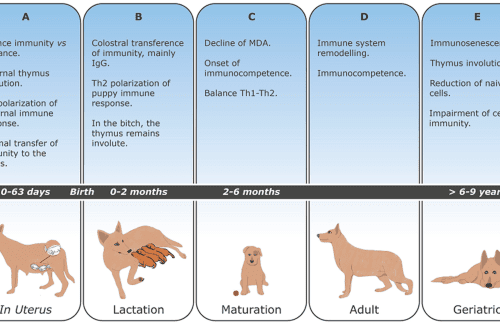
کیا کتے کو معلوم ہے کہ مالک کب واپس آئے گا؟
Many dog owners claim that their pets know exactly when family members will come home. Usually the dog goes to the door, window or gate and waits there.
In the photo: the dog looks out the window. Photo: flickr.com
How can dogs know the time of the owner’s return?
Studies in the UK and the US indicate that 45 to 52 percent of dog owners have noticed this behavior in their four-legged friends (Brown & Sheldrake, 1998 Sheldrake, Lawlor & Turney, 1998 Sheldrake & Smart, 1997). Often hosts attribute this ability to telepathy or a “sixth sense”, but there must be a more plausible explanation. And it was put forward several hypotheses:
- The dog can hear or smell the owner’s approach.
- The dog may respond to the owner’s normal return time.
- The dog may receive unwitting clues from other household members who know what time the missing family member returns.
- The animal can simply go to the place where the owner is waiting, regardless of whether he comes to the house or not. But people who are in the house can only notice this when such behavior coincides with the return of the absent person, forgetting about other cases. And then this phenomenon can be attributed to the example of selective memory.
To test all these hypotheses, we needed a dog that could anticipate the owner’s arrival at least 10 minutes before he walked through the door. Moreover, a person should return home at a different time. And the behavior of the dog must be recorded (for example, recorded on a video camera).




تصویر: pixabay.com
And such an experiment was conducted by Pamela Smart, the owner of a dog named Jaytee.
Jayty was adopted by Pamela Smart from a Manchester shelter in 1989 when he was still a puppy. She lived in an apartment on the ground floor. Pamela’s parents lived next door, and when she left home Jayty usually stayed with them.
In 1991, his parents noticed that every weekday Jytee went to the french window in the living room at about 16:30 p.m., the time when his mistress left work to drive home. The road took 45 – 60 minutes, and all this time Jayte was waiting at the window. Since Pamela worked a standard schedule, the family decided that Jaytee’s behavior had to do with timing.
In 1993, Pamela quit her job and was unemployed for some time. She often left home at different times, so her return could not be predicted, and her parents did not know when she would return. However, Jaytee still accurately guessed the time of her appearance.
In April 1994, Pamela learned that Rupert Sheldrake would be doing research on this phenomenon and volunteered to participate. The experiment lasted several years, and the results are amazing.
What did the results of the experiment show?
At the first stage, the parents recorded whether Jayte could guess the time of the hostess’s return. Pamela herself wrote down where she was, when she left home and how long the journey took. Also, the behavior of the dog was recorded on video. The camera turned on when Pamela left the house and turned off when she returned. Cases where Jaytee simply went to the window to bark at a cat or sleep in the sun were not counted.
In 85 out of 100 cases, Jaytee took a position at the window in the living room 10 minutes or more before Pamela returned and waited for her there. Moreover, when they compared the records of Pamela and her parents, it turned out that Jayte held the post at about the moment when Pamela left home, regardless of how far the starting point was and how long the road took.
Most often at this time, Pamela was 6 km from home or even further, that is, the dog could not hear the noise of the engine of her car. Moreover, parents noticed that Jytee guessed the time of the mistress’s return even when she was returning in cars unfamiliar to the dog.
Then the experiment began to make all sorts of changes. For example, the researchers tested whether Jaytee would guess the time of the hostess’s return if she was riding a bike, train, or taxi. He succeeded.
As a rule, Pamela did not warn her parents when she would return. She often did not know what time she would arrive at home. But perhaps her parents still expected the return of their daughter at one time or another and, consciously or unconsciously, broadcast their expectations to the dog?
To test this hypothesis, the researchers asked Pamela to return home at random intervals. No one else knew about this time. But even in these cases, Jayty knew exactly when to wait for the hostess. That is, the expectations of her parents have nothing to do with it.
In general, the researchers refined in different ways. Jayty stayed alone and with other members of the family, in different houses (in Pamela’s own apartment, with her parents and in the house of Pamela’s sister), the hostess left for different distances and at different times of the day. Sometimes she herself did not know when she would return (the researchers simply called her at different times and asked her to return home). Sometimes Pamela did not return home at all that day, for example, staying overnight in a hotel. The dog could not be fooled. When she returned, he always occupied an observation post – either at the window in the living room, or, for example, in Pamela’s sister’s house, jumped on the back of the sofa in order to be able to look out the window. And if the hostess did not plan to return that day, the dog did not sit at the window in vain waiting.
In fact, the results of the experiments refuted all four hypotheses put forward by the researchers. It seems that Jayte determined Pamela’s intention to go home, but how he did it is still impossible to explain. Well, except perhaps taking into account the possibility of telepathy, however, of course, this hypothesis cannot be taken seriously.
Rarely, but it happened that Jayti did not wait for the hostess in the usual place (15% of cases). But this was due either to fatigue after a long walk, or to illness, or to the presence of a bitch in estrus in the neighborhood. In only one case, Jaytee “failed the exam” for an unexplained reason.
Jaytee is not the only dog that has participated in such experiments. Other animals that showed similar results also became experimental. And the expectation of the owner is characteristic not only of dogs, but also of cats, parrots and horses (Sheldrake & Smart, 1997 Sheldrake, Lawlor & Turney, 1998 Brown and Sheldrake, 1998 Sheldrake, 1999a).
The results of the study were published in Journal of Scientific Exploration 14, 233-255 (2000) (Rupert Sheldrake and Pamela Smart)
Does your dog know when you will return home?







